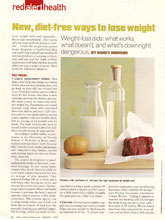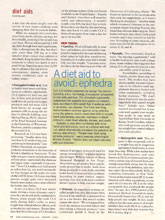New, Diet-free Ways to Lose Weight
Weight Loss Aids: What works, what doesn’t, and what’s downright dangerous
Loos weight fast—and naturally…Boost your metabolism…Pare inches off your waist without dieting or exercise…Cruise the weight-loss section in any drugstore or health-food shop and you’ll find yourself surrounded by various products promising to burn, trap, and zap your fat. Some of these supplements will help you lose pounds; others are just a waste of money. How to tell the difference? Read on.
Try These
Liquid replacement shakes. Diet shakes don’t help you change your eating habits; once you stop drinking them, you go back to your old, pre-weight-loss ways. Nutrition experts used to criticize them for this reason, but there is now solid data proving that shakes can actually make it easier to reduce and maintain weight loss. For instance, in a recent German study, those who consumed Slim-Fast shakes and bars (220 calories each) for two meals and two snacks a day, together with one sensible meal, lost an average of 16 pounds over 12 weeks. The study subjects who were on typical calorie-restricted diets lost only three pounds during the same period.
According to Judith Ashley, a nutritionist at the University of Nevada School of Medicine in Reno, meal-replacement products work because they control calorie intake and portion size—important since hidden calories and oversize meals are often to blame when diets fail.
The newest development in meal-replacement drinks is Satietrol, a pre-meal beverage. In one recent study, women who drank Satietrol while on a six-week calorie-restricted diet lost an average of nine pounds. They reported feeling full up to three and a half hours after having the drink and also ate less at the next meal. The beverage contains potato fibers and works because it activates the body’s natural appetite-control protein, called cholecystokinin. This protein signals you to stop eating when you’re full and slows the movement of food from the stomach, keeping you satisfied longer. The beverage, which you drink 15 minutes before eating a meal, contains 80 calories and is available at GNC stores for a little more than a dollar (rough the same price as a Slim-Fast shake).
Calcium. Several recent studies suggest that increasing your calcium intake helps you lose weight by blocking the accumulation of fat. “Calcium temporarily suppresses your parathyroid hormone, which regulates fat storage,” says Purdue University nutritionist Connie Weaver. “Taking it appears to increase fat burning and discourages fat from being stored in your cells.” In a study of 54 women, Weaver found that those who consumed the most calcium and ate fewer than 1,900 calories a day lost the most weight over the course of two years—without even changing their diet or exercise habits.
While the research isn’t conclusive, your body needs calcium anyway, for bone health, so trying it for weight loss can’t hurt. Weaver advises getting 1,000 mg daily through food and supplements. Take it throughout the day, but don’t take more than 500 mg at a time (smaller doses ensure that calcium is absorbed). Keep in mind that this is one situation in which too much is not a good thing: Ingesting more than 2,500 mg of calcium a day can lead to constipation, nausea and even serious conditions such as kidney stones.
Conjugated linoleic acid. Sold through health-food stores and drugstores as a dietary supplement, CLA appears to help you zap fat. A fatty acid derived from sunflower oil and found in dairy products and red meat, CLA both blocks fat storage and prompts cells to dump the fat they’re already holding, says Michael Pariza, Ph.D., director of the Food Research Institute at the University of Wisconsin, Madison, and the scientist who first discovered CLA.
Research on CLA has been promising: “Studies show that over four to 12 weeks of use, you can lose up to four pounds,” says Delbert Dorscheid, an assistant professor of medicine at the University of British Columbia in Vancouver. “It also helps you gain muscle, to help trim inches off fatty areas—particularly the abdomen and upper arms—especially if you exercise.” Since CLA makes you build muscle as well as lose fat, you won’t necessarily see big changes on the scale, but your clothes will fit better. CLA may even help prevent weight gain, since increased muscle mass makes you a more efficient fat burner, says Pariza.
At the very least, CLA may simply make dieting a more pleasant experience: In a six-month study conducted by Pariza, obese people who took CLA while dieting didn’t suffer as many weight-loss-related adverse effects, such as headache and nausea. (Pariza theorizes that this is because of CLA’s effects on the immune system.) Only two brands available in the United States—Tonalin and Clarinol—have been well tested for safety and effectiveness. A month’s supply costs $30, but don’t buy in bulk: Researchers say that for the time being, they only know it’s safe to take CLA in doses of one gram three times a day for up to six months.
SKIP THESE:
Carnitine. Produced naturally in your liver and kidneys, this vitaminlike compound is supposed to increase fat burning when taken in high-dose supplements. Scientifically it makes sense that it would help you lose weight: “Carnitine transfers fat to the fat-burning part of the cell instead of storing it, so it can be used for energy immediately,” explains exercise physiologist William Sukula of Sharp Memorial Hospital in San Diego. Nevertheless, no studies have conclusively proven that it works. Aside from being produced in your body, carnitine is also found in meat and dairy products. According to some studies, supplementing your diet with more carnitine doesn’t appear to help you lose weight.
Chitosan. An ingredient in many so-called weight-loss aids, this dietary fiber, derived from shellfish, is purported to act as a fat blocker. But several studies dispute this claim: “We investigated how much fat subjects excreted before and after taking a chitosan product, says Judith S. Stern of the University of California, Davis. “We found no increase in fat excretion after they took the supplement , so it wasn’t blocking fat absorption.” Another study, which compared chitosan to the prescription weight -loss drug Xenical, also found that chitosan doesn’t trap fat. Don’t bother taking it, since there’s little proof it works and it may actually be bad for you: According to some research, chitosan may inhibit the absorption of vitamins A, D, and K.
Pyruvate. This compound, found in many “fat-burning supplements” sold in health-food stores, may work in large doses. Some evidence has suggested that taking 22 to 28 grams of pyruvate a day can mildly assist in fat loss.
Nevertheless, according to Sukula, smaller doses may not work. The studies that have shown smaller amounts of pyruvate may be effective used supplements that were loaded with other compounds, including herbal diuretics. “We don’t know if pyruvate was the active ingredient that caused weight loss,” Sukula says. Other research has found that it may even work against your weight-loss goals: In one study at Appalachian State University in Boone, North Carolina, subjects who took pyruvate actually lost less weight than control subjects who took placebos.
Hydroxycitric acid. This vitamin C-like compound, sold as a weight-loss aid in drugstores and natural-food stores, is more hype than help. While a few studies have found that hydroxycitric acid (also known as HCA or hydroxycitrate) prevents a certain type of enzyme from converting excess body energy into fat, these studies are far from definitive, says Steven Heymsfield, M.D., of Columbia University in New York. “Some of the studies tested HCA in combination with other ingredients, so you can’t tell if it was the HCA or the other compounds that produced the weight loss,” he says. In a 1998 Journal of the American Medical Association study, Heymsfield found that HCA did not help people lose weight. In fact, study subjects lost the same amount of weight whether they took HCA or a placebo. Since there’s very little data to prove that HCA works, skip it.
A diet aid to avoid: ephedra
Can 2.5 million customers be wrong? You betcha. Ephedra, a.k.a. ma huang, is a popular component in diet pills and teas. The stimulant supposedly suppresses the appetite and speeds up the metabolism, but there’s little proof that it works as well—or as safely—as claimed. The Food and Drug Administration cautions against using ephedra, since the adverse events associated with it include heart palpitations, seizures, increases in blood pressure—even heart attacks, strokes, and death.
Ephedra is often combined with other herbs and stimulants, such as caffeine and kola nut, which dramatically increases the potential for serious side effects. “People have died using ephedra products,” warns exercise physiologist William Sukula. “Herbal does not mean naturally safe and effective.”

